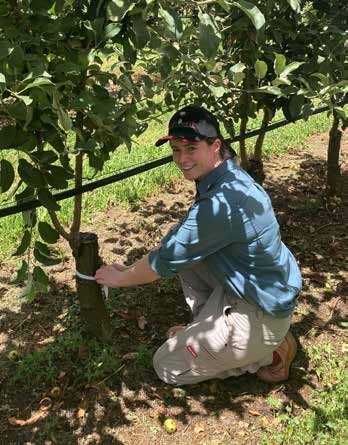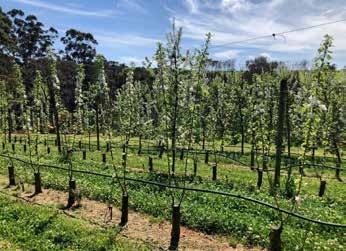PIPS4 POMEWEST
SOUTH WEST
TO POMEWEST
Meet Jennifer Riseley: the new food-focused professional helping deliver PIPS 4 Profit in 2024.
Words Pomewest

JENNIFER (Jen) Riseley began with Pomewest in mid-January 2024 and has hit the ground running with three projects ready to start trials in autumn 2024. Born and raised in Bridgetown, Jen has a local connection to the south-west area of Western Australia and has spent the past five years working at the Southern Forests Food Council in Manjimup.
Jen and her partner Mitchell East are passionfruit farmers, providing first-hand experience as WA producers. With horticultural experience and strong marketing, communication and team-building skills, she has coordinated multiple retail marketing campaigns in the Perth metro area to drive consumer demand for locally grown fresh produce. Her work as Regional Node Lead for the South West WA Drought Hub has built extension and workshop delivery skills aimed at WA farmers.
Jen will assist project manager Susie Murphy White to implement a new Hort Innovation Apple and Pear Research and Development Levy and the Australian Government-funded PIPS4 Profit Program in WA. She will provide support to three projects: PIPS 4 Profit – Building Sustainable Soils (AP22003), PIPS 4 Profit – Pest and Disease Management (AP22001), including trial work, extension and other industry activities. She will also assist Dr Dario Stefanelli and the DPIRD horticulture team in the delivery to growers of PIPS 4 Profit – Optimising Apple Production Systems (AP22004). The PIPS 4 Profit Program will have significant outcomes for the sector’s future. It will be delivered over the next four and a half years, improving our R&D delivery and aligning with the current strategic plan’s key objectives to enhance the industry's profitability and sustainability.
“ With horticultural experience and strong marketing, communication and team-building skills, she has coordinated multiple retail marketing campaigns ”
PIPS at a glance
Now in its fourth iteration, the Productivity, Irrigation, Pests and Soils (PIPS) program began in 2009 to deliver whole-of-orchard system research, development and demonstration that continues to drive Australian apple and pear production today.
The PIPS 4 Profit Program is being delivered over five years, from 2023-2028, and comprises an experienced national team led by the Tasmanian Institute of Agriculture and Agriculture Victoria. Pomewest and DPIRD are delivering the WA components with four areas of activity.

• AP22001 – Pests: Integrated Pest and Disease Management
Building upon the previous project AP19002, AP22001 aims to test the effectiveness of biological controls for light brown apple moth and Mediterranean fruit fly. Native parasitoid wasps from eastern Australia, such as Diachasmimorpha krausii and certain Trichogramma, have shown very promising results domestically and internationally for establishing in temperate environments and attacking multiple pest species. The project will assess the safe introduction of these species to WA and evaluate orchard management practices that are designed to support habitat and food source availability, balanced parasitoid/ predator populations and soil health (in partnership with the Building Sustainable Soils project). The aim is a best practice guide for producers to replicate positive results on farm in a commercially viable way. So far one trial site has been identified at Ladycroft Orchard in Manjimup.
• AP22003 – Soils: Building Sustainable Soils
Following the AP19006 project, longer term data was needed to show the impacts of inter-row and under-tree treatments on soil health over multiple growing seasons. The project will trial different under-tree options: a bare herbicide strip, living legume mulch, woody mulch, a native flowering cover crop, producer mow and throw options. This trial is once again taking place at Ladycroft Orchard in Manjimup. Together with measurements of soil health, data on pest and disease pressure, tree growth and fruit yield will be analysed to examine for multi-layered benefits. The WA element of the project aims to answer the questions: “How do we feed the carbon cycle by improving the under-tree strip? What are the benefits of moving away from the bare earth under the tree line? Can under-tree treatments have a positive effect on fruit quality and yield by improving the soil health?”
The project also features a PhD study in NSW investigating benefits to soil carbon levels with orchard floor management and whether increases in soil carbon can be viable income from a carbon market, or if farmers are better off prioritising accessible soil nutrients.
• AP22004Productivity: Optimising Apple Production Systems
This project analyses WA and Tasmanian systems of orchard renovation to identify effective and profitable methods of rejuvenating orchards without replanting. The change in producer resources required for thinning, pruning, crop load management and the costs of retraining will all be considered. Variations in crop load, flowering and canopy vigour will be measured both manually and using digital imaging, including LiDAR, to analyse the commercial viability for producers to use the technology. One trial site at RK & J Fox & Son in Pemberton has already been selected to rework a Fuji block into Granny Smith. If you are considering orchard renovations, such as changing variety on existing rootstock, changing trellis style or plant spacing without replacing the orchard, and are interested in being part of the project, please get in touch.
What’s Happening Nationally?
At a national level the PIPS4 project will investigate various methods of crop-load management (spur extinction, soft chemicals, manual and combinations) and their effects on carbohydrate
partitioning. A PhD will be involved in the research in SA. There will also be an investigation of retractable netting on pears in Victoria.
Preparation of Case Studies
Throughout the projects, producer business case studies will be developed to put the aims of projects into a farmer context. The national program prioritises regional leadership, ensuring each state focuses on issues and methods relevant to their conditions and showcases local business experience for the industry to draw from.
FOR MORE INFORMATION
Jen Riseley (08) 9777 0185, jen.riseley@ dpird.wa.gov.au. Visit the APAL website or scane the QR code.

Acknowledgements The PIPS4 Profit Program has been funded by Hort Innovation, using the apple and pear research and development levy, contributions from the Australian Government and co-investment from Agriculture Victoria and the Tasmanian Institute of Agriculture. It is co-funded in Western Australia by the WA Department of Primary Industries and Regional Development and supported by Pomewest. Hort Innovation is the grower-owned, notfor-profit research and development corporation for Australian horticulture.